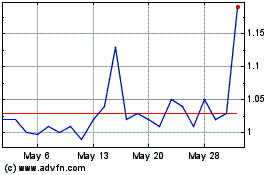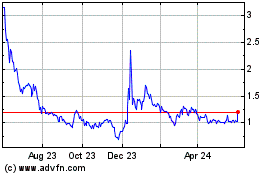IN8bio Reports Continued Durable Remissions in Phase 1 Trial of INB-200 in Plenary Oral Presentation at the Society for Neuro-Oncology (SNO) Annual Meeting
November 25 2024 - 6:00AM

IN8bio, Inc. (Nasdaq: INAB), a clinical-stage biopharmaceutical
company developing innovative gamma-delta T cell therapies,
presented results from the fully enrolled Phase 1 trial of INB-200
in a plenary oral presentation at the 29th Annual Meeting of the
Society for Neuro-Oncology in Houston, TX. The survival data along
with histopathology and radiographic data are indicative of
positive treatment effects, which highlight the potential of
IN8bio’s genetically modified, chemotherapy-resistant gamma-delta T
cells as a potential first-in-class therapy for patients with solid
tumor cancers such as glioblastoma (GBM).
“As the clinical trial data continues to mature,
this novel immuno-cell therapy leveraging gamma-delta T cells is
highly feasible with a well-tolerated safety profile and biological
evidence of improved immune surveillance in glioblastoma patients,”
said Burt Nabors, M.D., Division Director, Neuro-Oncology at the
Heersink School of Medicine at the University of Alabama at
Birmingham.
“This novel treatment leverages the DNA damage
induced by chemotherapy combined with genetically engineered
gamma-delta T cells and we believe it represents a significant
advancement in the treatment of solid tumor cancers such as GBM,”
said William Ho, co-founder and CEO of IN8bio. “Glioblastomas are
often classified as cold, immune desert tumors due to their limited
immune cell infiltration. For the first time, we have confirmed the
infiltration of gamma-delta T cells into these tumors through
paired tissue biopsies following treatment with INB-200. We are
encouraged by the patient follow-up with repeat dose patients
demonstrating a 79% increase in median PFS as compared to 6.9
months as reported by the Stupp regimen and an almost 50% increase
in median PFS as compared to the 8.3 months in the three patients
treated with only a single dose of INB-200 in Cohort 1. The
addition of IN8bio’s DeltEx drug resistant immunotherapy (DRI)
gamma-delta T cells show the potential for extending PFS in this
difficult-to-treat patient population when INB-200 was administered
in combination with the current standard-of-care used to treat
newly diagnosed GBM patients.”
The Phase 1 trial assessed the safety and
preliminary efficacy of the addition of DeltEx DRI gamma-delta T
cells to maintenance therapy with TMZ. The trial assessed the
administration of 1x107 cells per dose across three different
dosing regimens increasing from a single dose in Cohort 1, three
doses in Cohort 2, and six doses in Cohort 3. A total of 13
patients have been enrolled and treated with INB-200, including
three patients in Cohort 1, four patients in Cohort 2 and six
patients in Cohort 3.
Key findings from the INB-200 Phase 1 trial:
- 92% of evaluable
patients treated with INB-200 for GBM surpassed a median
standard-of-care (Stupp regimen) PFS of 6.9 months, with a majority
exceeding their expected PFS based on their age and the MGMT status
of their tumors.
- One patient with
an IDH-mutant glioma remains alive and progression free at over
40.5 months; IDH-mutant patients in a recently published clinical
trial demonstrated a median PFS of 11.1 months in the control arm
and 27.7 months in the experimental arm.
- No
treatment-related serious adverse events, dose-limiting toxicities,
cytokine release syndrome, infusion reactions, or immune effector
cell-associated neurotoxicity syndrome have been reported in any
cohort.
- The most common
treatment emergent adverse events were Grade 1-2 toxicities
consisting of white blood cell and platelet count decreases related
to standard-of-care TMZ.
- Gamma-delta T
cells and other immune subsets such as CD3+ and CD8+ T cells were
found in relapsed tumor biopsies in two patients after treatment
with INB-200, pointing to persistence of DRI gamma-delta T
cells.
- Gamma-delta T cells were within the
normal range post-resection and remained stable with repeated doses
(Cohorts 2 and 3), whereas the gamma-delta T cells in Cohort 1
continued to drop after the maintenance cycles with TMZ were
initiated. This implies that repeat dosing of gamma-delta T cells
may globally benefit the peripheral immune environment.
- T cells were low prior to surgery,
rose after resection and during the cell collection for the
product, were below normal during chemotherapy, and in Cohorts 2
and 3 returned to the normal range following treatment.
- Radiographic
evaluation pre- and post-treatment included resolution of midline
shift in one patient with evidence of changes in enhancement
attributed to treatment effect in multiple patients. One subject
was found to have a 36% decrease in a lesion attributed to positive
treatment effect.
About IN8bioIN8bio is a clinical-stage
biopharmaceutical company developing gamma-delta T cell-based
immunotherapies for cancer patients. Gamma-delta T cells are a
specialized population of T cells that possess unique properties,
including the ability to differentiate between healthy and diseased
tissue. The company’s lead program, INB-100, is focused on AML
evaluating haplo-matched allogenic gamma-delta T cells given to
patients following a hematopoietic stem cell transplant. The
company is also evaluating autologous DeltEx DRI gamma-delta T
cells, in combination with standard of care, for glioblastoma. For
more information about IN8bio, visit www.IN8bio.com.
Forward Looking StatementsThis press release
may contain forward-looking statements made pursuant to the safe
harbor provisions of the Private Securities Litigation Reform Act
of 1995. These statements may be identified by words such as
“aims,” “anticipates,” “believes,” “could,” “estimates,” “expects,”
“forecasts,” “goal,” “intends,” “may,” “plans,” “possible,”
“potential,” “seeks,” “will” and variations of these words or
similar expressions that are intended to identify forward-looking
statements, although not all forward-looking statements contain
these words. Forward-looking statements in this press release
include, but are not limited to, statements regarding: the
potential of IN8bio’s genetically modified, chemotherapy-resistant
gamma-delta T cells as a potential first-in-class therapy for
patients with solid tumor cancers such as GBM; the potential of
IN8bio’s DeltEx DRI gamma-delta T cells to extend PFS when
administered in combination with the current standard of care used
to treat newly diagnosed GBM patients; IN8bio’s ability to achieve
anticipated milestones, including the advancement of clinical
development plans; and other statements that are not historical
fact. IN8bio may not actually achieve the plans, intentions or
expectations disclosed in these forward-looking statements, and you
should not place undue reliance on these forward-looking
statements. Actual results or events could differ materially from
the plans, intentions and expectations disclosed in these
forward-looking statements as a result of various factors,
including: risks to site initiation, clinical trial commencement,
patient enrollment and follow-up, as well as IN8bio’s ability to
meet anticipated deadlines and milestones; uncertainties inherent
in the initiation and completion of preclinical studies and
clinical trials and clinical development of IN8bio’s product
candidates; the risk that IN8bio may be unable to raise additional
capital and could be forced to delay, further reduce or to explore
other strategic options for certain of our development programs, or
even terminate its operations; IN8bio’s ability to continue to
operate as a going concern; the risk that IN8bio may not realize
the intended benefits of its DeltEx platform; availability and
timing of results from preclinical studies and clinical trials;
whether the outcomes of preclinical studies will be predictive of
clinical trial results; whether initial or interim results from a
clinical trial will be predictive of the final results of the trial
or the results of future trials; the risk that trials and studies
may be delayed and may not have satisfactory outcomes; potential
adverse effects arising from the testing or use of IN8bio’s product
candidates; the uncertainty of regulatory approvals to conduct
trials or to market products; IN8bio’s reliance on third parties,
including licensors and clinical research organizations; and other
important factors, any of which could cause our actual results to
differ from those contained in the forward-looking statements, are
described in greater detail in the section entitled “Risk Factors”
in our Quarterly Report on Form 10-Q filed with the Securities and
Exchange Commission (SEC) on November 12, 2024, as well as in other
filings IN8bio may make with the SEC in the future. Any
forward-looking statements contained in this press release speak
only as of the date hereof, and IN8bio expressly disclaims any
obligation to update any forward-looking statements contained
herein, whether because of any new information, future events,
changed circumstances or otherwise, except as otherwise required by
law.
Investor & Company Contacts:
Glenn Schulman, PharmD, MPHZ3 BioCommunications,
llc203.494.7411glenn@z3bio.com
Patrick McCallIN8bio, Inc.646.933.5603pfmccall@IN8bio.com
Media Contact:Kimberly HaKKH
Advisors917.291.5744kimberly.ha@kkhadvisors.com
IN8bio (NASDAQ:INAB)
Historical Stock Chart
From Dec 2024 to Jan 2025

IN8bio (NASDAQ:INAB)
Historical Stock Chart
From Jan 2024 to Jan 2025
